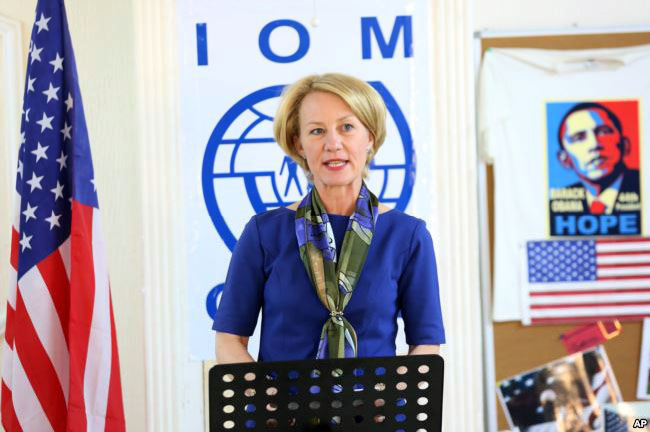WASHINGTON - With the Trump administration's revised South Asia strategy still in its infancy, the curtain has silently fallen on the office of the Special Representative for Afghanistan and Pakistan (SRAP), ending months of speculations that the State Department planned to eliminate the unit.
The office of the special envoy was tasked with heralding reconciliation efforts with the Taliban and other political factions in Afghanistan.
State Department officials, who wished to remain anonymous due to the sensitivity of the matter, told VOA the core SRAP team focused on Afghan reconciliation was dissolved on Sept. 29. The unit will be integrated into the broader South and Central Asia Bureau.
Most of the office's employees, according to officials, were temporary civil servants who lost their jobs because their contracts were not renewed.
Remaining staff
A State Department spokesperson told VOA that former SRAP staff remain at the department and are reporting to Alice Wells, who serves as the acting special representative for Afghanistan and Pakistan and as the acting assistant secretary for the Bureau of South and Central Asian Affairs.
"She [Wells] will also work to integrate SCA Bureau and SRAP operations. State Department employees arrive and depart from positions regularly, and we have well-established mechanisms to transfer their expertise and contacts to successors," the spokesperson told VOA.
Current and former U.S. diplomats say the SRAP office focused on three specific areas.
First, the unit took the lead in pursuing Afghan reconciliation, specifically talks with the Taliban. Second, the office was tasked with building support for its efforts within the international community, including at EU and NATO summits. And lastly, the SRAP office took steps to facilitate the success of Afghanistan's national unity government, including putting together the Ashraf Ghani-Abdullah Abdullah political deal in Afghanistan.
State Department officials say Wells is tasked with heading efforts to integrate SRAP operations within the broader South and Central Asia Bureau.
The consolidation began in June, with the departure of then-acting SRAP Laurel Miller.
Integration
A State Department spokesperson told VOA, "We are at the beginning of a process to determine the bureaucratic and management steps required to integrate the SCA bureau and SRAP operations. But no decisions have yet been made with respect to the timeline and process of this integration."
This lack of clarity has added to the apparent sense of uncertainty within the State Department, which is already dealing with proposed budget cuts and a number of unfilled positions.
Some former senior U.S. diplomats are skeptical about the timing of the decision to roll back SRAP, saying disbanding the policy team and losing crucial expertise increases risk at a time when the United States is renewing its commitment to stabilizing Afghanistan and promoting reconciliation.
"Unfortunately, I think with the closure of SRAP office or really a departure of temporary employees, we have lost a great deal of expertise and institutional knowledge — deep domain expertise about the Taliban and how to attempt to negotiate with the Taliban," said former Special Representative for Afghanistan and Pakistan Richard Olson.
Olson, who also served as the U.S. ambassador to Pakistan, noted, "There continues to be a need for some kind of special envoy, special representative — whatever you want to call it — someone who is focused full time on Afghan reconciliation that is pursuing political settlement."
He added if the U.S. is going to get a diplomatic initiative going, "you can't wait till you have the initiative to build the team."
Olson, however, acknowledged that the integration of SRAP's duties into a broader bureau may add some clarity to South Asia strategy.
"The disadvantage to SRAP was putting India and Pakistan in separate bureaucratic domains, which tended to reduce the coherence of U.S. policy toward South Asia," he said.
Now a lost relic of former President Barack Obama's administration, the SRAP post was created in the wake of a troop surge in the Afghan war, with Richard Holbrooke appointed to lead U.S. policy in the volatile Afghan-Pakistan war zone. (VoA)
Home » Afghanistan » US Shutters Special Representative for Afghanistan-Pakistan Office
US Shutters Special Representative for Afghanistan-Pakistan Office

